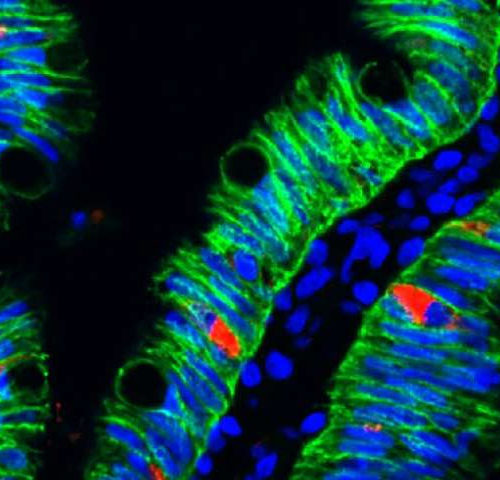by Cincinnati Children’s Hospital Medical Center A human intestinal organoid with enteroendocrine cells (red) embedded within the intestinal cells of the HIO (green). Scientists at Cincinnati Children’s used human intestinal organoids grown from stem cells to discover how our bodies control the absorption of nutrients from the food we eat. They further found that one hormone...
Tag: <span>hormone</span>
The hormone glucagon may be a warning light for diabetes
UNIVERSITY OF COPENHAGEN THE FACULTY OF HEALTH AND MEDICAL SCIENCES Up to one in four Danes has an unhealthy accumulation of fat in the liver, also known as fatty liver. Fatty liver is rarely the cause of symptoms in itself, but people with fatty liver have an increased risk of developing diabetes. Exactly how the...
Promising approach: Prevent diabetes with intermittent fasting
DEUTSCHES ZENTRUM FUER DIABETESFORSCHUNG DZD Intermittent fasting is known to improve sensitivity to the blood glucose-lowering hormone insulin and to protect against fatty liver. DZD scientists from DIfE have now discovered that mice on an intermittent fasting regimen also exhibited lower pancreatic fat. In their current study published in the journal Metabolism, the researchers showed the mechanism by which pancreatic fat...
Hormone produced during pregnancy repurposed to treat painful joint condition
by Beth Israel Deaconess Medical Center Beginning in the first trimester of pregnancy, the body begins to produce the hormone relaxin, which loosens the expectant mother’s muscles, joints and ligaments to help her body accommodate a growing baby and prepare for birth. When Edward Rodriguez, MD, Ph.D., Chief of Orthopedic Trauma in the Department of...
Sex-specific effects of DHEA on bone mineral density and body composition
Among older women, the naturally occurring hormone DHEA may preserve bone and muscle mass when compared with placebo, study suggests UNIVERSITY OF COLORADO ANSCHUTZ MEDICAL CAMPUS AURORA, Colo. (Dec. 4, 2018) – Women 55 and older have an increased risk of bone and muscle loss but therapy with the hormone Dehydroepiandrosterone (DHEA) may help prevent bone loss and increase...
Found: A destructive mechanism that blocks the brain from knowing when to stop eating
An international team of researchers has uncovered a destructive mechanism at the molecular level that causes a well-known phenomenon associated with obesity, called leptin resistance. Mice fed a high-fat diet produce an enzyme named MMP-2 that clips receptors for the hormone leptin from the surface of neuronal cells in the hypothalamus. This blocks leptin from binding to...
Targeting one hormone may help treat bowel cancer
By Catharine Paddock PhD Fact checked by Jasmin Collier Scientists in Spain have discovered a mechanism that promotes inflammation-related bowel cancer and could offer new treatment targets. The finding concerns the activity of the signaling protein p38 in the myeloid cells of the immune system and that of IGF-1, which is a hormone triggered by p38. Researchers...
- 1
- 2

